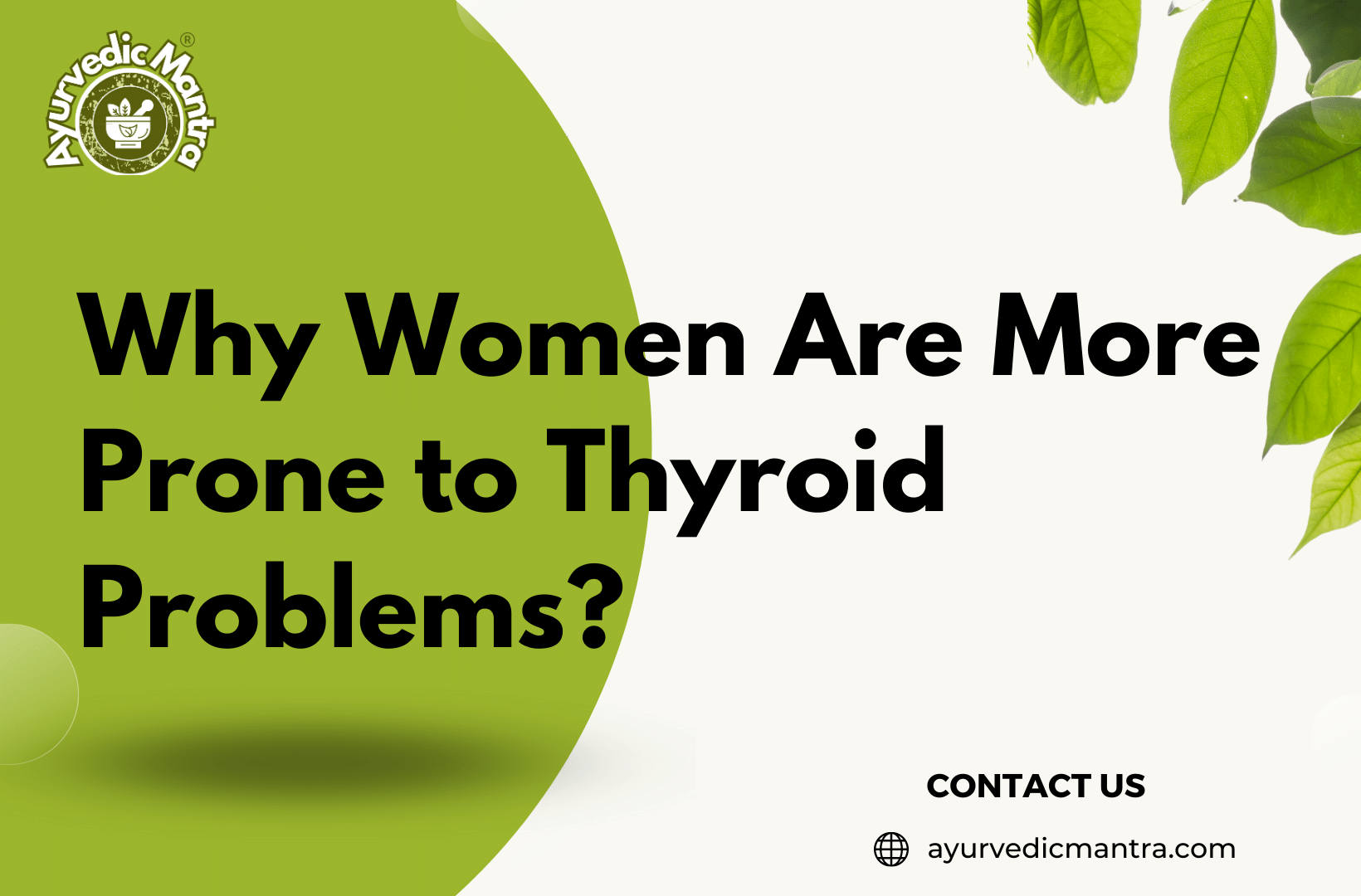
PCOD/PCOS: Ayurvedic Treatment is Best
Introduction Polycystic Ovary Disorder (PCOD) or Polycystic Ovary Syndrome (PCOS) is a common endocrine disorder affecting millions of women worldwide. It leads to hormonal imbalances,

Thyroid problems have become increasingly prevalent in today’s society, affecting millions of individuals across the globe. While both men and women can experience thyroid issues, it is a well-established fact that women are more susceptible to these problems. This article delves into the various factors contributing to this gender disparity and sheds light on why women are more prone to thyroid problems.
One of the primary reasons behind women’s heightened vulnerability to thyroid problems is their intricate hormonal balance. The thyroid gland regulates metabolism and energy levels, closely intertwined with hormonal fluctuations. Throughout a woman’s life, she experiences significant hormonal shifts during puberty, menstruation, pregnancy, and menopause. These fluctuations can impact thyroid function and potentially lead to imbalances.
Pregnancy is a transformative phase that stresses a woman’s body, including the thyroid gland. The growing fetus relies on the mother’s thyroid hormones for proper development, sometimes leading to an increased demand for the thyroid. Moreover, postpartum hormonal changes, sleep deprivation, and added stress can further disrupt thyroid function.
Autoimmune disorders, such as Hashimoto’s thyroiditis and Graves’ disease, are more prevalent in women. These conditions occur when the immune system mistakenly attacks the thyroid gland, leading to inflammation and potential dysfunction. The reasons behind the gender bias in autoimmune thyroid disorders remain unclear, but genetic, hormonal, and environmental factors are believed to contribute.
Estrogen, a predominantly female hormone, can impact thyroid function. High estrogen levels have been linked to an increase in thyroid-binding proteins, which can affect the availability of thyroid hormones in the body. This interaction between estrogen and thyroid hormones can contribute to developing thyroid problems.
Nutritional deficiencies can also play a role in thyroid health, and women may be more prone to such defects due to factors like menstrual blood loss and dieting. Iodine and selenium, essential minerals for thyroid function, are crucial components that women should monitor to support their thyroid health.
Stress management is essential for maintaining overall health, including thyroid function. Women often juggle multiple roles, and the demands of modern life can lead to chronic stress. In response to stress, the body releases cortisol, which, when consistently elevated, can interfere with thyroid hormone production and utilization.
Exposure to environmental toxins, such as endocrine-disrupting chemicals found in certain plastics and pollutants, can impact thyroid function. Some studies suggest that women might be more exposed to these toxins due to their daily use of cosmetics, skincare products, and household items.
Genetics can also influence an individual’s susceptibility to thyroid problems. Genetic markers and family history can increase the likelihood of developing thyroid disorders. Women with a family history of thyroid issues may be at a higher risk.
Women generally have a longer life expectancy than men. While this is undoubtedly a positive aspect, it also means that women are exposed to potential thyroid issues for extended periods. As they age, hormonal changes and other factors can contribute to thyroid imbalances.
Women often exhibit different healthcare-seeking behaviors compared to men. They are generally more proactive about their health and may be more likely to report symptoms, leading to higher detection rates of thyroid problems.
In conclusion, several interconnected factors explain why women are more prone to thyroid problems. Hormonal fluctuations, pregnancy-related changes, autoimmune disorders, estrogen’s influence, nutritional factors, stress, environmental toxins, genetics, longer life expectancy, and healthcare-seeking behavior all play roles in this disparity. Women must be proactive about their thyroid health, focusing on stress management, proper nutrition, and regular check-ups to maintain optimal thyroid function.
Women are more susceptible to thyroid problems due to their complex hormonal balance. Hormonal fluctuations during various life stages, such as puberty, menstruation, pregnancy, and menopause, can impact thyroid function. Additionally, autoimmune disorders and the influence of estrogen further contribute to this gender disparity.
Pregnancy places increased stress on the thyroid gland. The growing fetus relies on maternal thyroid hormones for proper development, potentially leading to an elevated demand for the thyroid. Postpartum hormonal changes and added stress can further disrupt thyroid function, sometimes triggering thyroid issues.
Autoimmune disorders, such as Hashimoto’s thyroiditis and Graves’ disease, are more prevalent in women. These conditions occur when the immune system mistakenly attacks the thyroid gland, causing inflammation and potential dysfunction. Genetic, hormonal, and environmental factors are believed to contribute to this gender bias.
Yes, estrogen, a primarily female hormone, can influence thyroid function. Elevated estrogen levels can affect thyroid-binding proteins, potentially altering the availability of thyroid hormones in the body. This interaction between estrogen and thyroid hormones can contribute to developing thyroid problems.
Nutritional deficiencies can play a role in thyroid health, and women may be more susceptible due to factors like menstrual blood loss and dieting. Essential minerals like iodine and selenium, crucial for thyroid function, should be monitored to support overall thyroid health.
Chronic stress, often experienced by women due to multiple responsibilities, can impact thyroid health. Stress triggers the release of cortisol, which, when consistently elevated, can interfere with thyroid hormone production and utilization, potentially leading to thyroid imbalances.
Yes, exposure to environmental toxins, such as endocrine-disrupting chemicals in plastics and pollutants, can impact thyroid function. Women might be more exposed to these toxins due to using cosmetics, skincare products, and household items containing such chemicals.
Genetics can influence an individual’s susceptibility to thyroid disorders. Specific genetic markers and a family history of thyroid issues can increase the likelihood of developing thyroid problems. Women with a family history may be at a higher risk.
Women’s longer life expectancy means they are exposed to potential thyroid issues for an extended period. As they age, hormonal changes and other factors can contribute to thyroid imbalances, emphasizing the importance of proactive thyroid health management.
Yes, women often exhibit different healthcare-seeking behaviors. They are generally more proactive about their health and may be more likely to report symptoms, leading to higher detection rates of thyroid problems. This increased awareness can contribute to better management and treatment outcomes.

Introduction Polycystic Ovary Disorder (PCOD) or Polycystic Ovary Syndrome (PCOS) is a common endocrine disorder affecting millions of women worldwide. It leads to hormonal imbalances,

Introduction Losing weight is a journey that requires dedication, consistency, and self-care. While there are numerous weight loss techniques out there, not all of them

Polycystic Ovary Syndrome (PCOS) is a hormonal disorder that affects millions of women worldwide. It can lead to various health complications, such as irregular periods,

In recent years, Ayurveda, an ancient system of natural healing originating from India, has gained significant popularity as an alternative approach to treating various health

आजकल वजन बढ़ने और चर्बी की वृद्धि होने की समस्या एक आम समस्या बन गई है। बढ़ते वजन और अतिरिक्त चर्बी के कारण न केवल

प्रस्तावना: आजकल वजन बढ़ने और ओबेसिटी की समस्या एक आम समस्या बन गई है। बढ़ते वजन के कारण न केवल शारीरिक समस्याएं होती हैं, बल्कि
